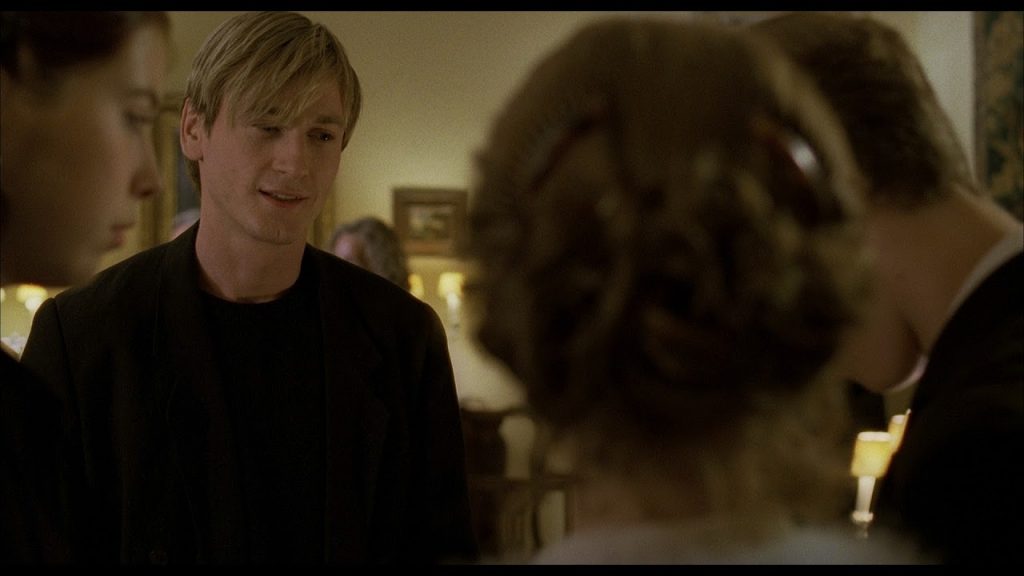
The Piano Teacher (2001; Michael Haneke)
GRADE: B
By Mike Dub
Throughout his well-regarded and controversial career, Michael Haneke has specialized in disturbing violence. With unnerving precision, Haneke unfurls stories that build delicately to sudden, shocking explosions of blood and death. In The Piano Teacher, based on a novel by Nobel Prize winner Elfriede Jelinek, Haneke has found source material right up his alley. However, while it is a good film, there seems to be something lost in his adaptation, which, in the end, may fall closer to pleasure than pain in watching the title character’s slow crawl into despair.
The Piano Teacher stars Isabelle Huppert as Erika Kohut, a former piano prodigy who is now a middle-aged spinster teaching at a well-respected conservatory. She seems to be the most respected teacher there, but she is also the most demanding, callously deriding her students until they are all but incapable of playing, or even until they break down crying.
“A concert pianist must have nerves of steel,” she admonishes one particularly sensitive student, though we can easily sense the sadism underlying her sternness. Erika is a flower that has never blossomed. Her father died in an asylum just after the Second World War, and her mother (Annie Girardot), a vile and domineering tyrant, has kept her under such lock and key, emotionally as well as physically, that Erika is mired in a confused, middle-aged, virginal adolescence.
Most of the first half of the film is occupied with unveiling Erika’s extraordinarily neurotic adventures. She sleeps in the same bed as her mother. She visits a viewing booth in a porn shop and smells the used tissues of men who were in the booth before her. She cuts herself high on the thigh with a razor. She wanders a drive-in movie parking lot until she finds a couple having sex in their car, and when she kneels down directly next to them to listen, she allows herself a different kind of pleasure than we are expecting. Then into her life comes Walter, young, good-looking, and a magnificent piano player.
Without much motivation, as is often the case in movies about middle-aged women’s sexuality, he falls in love with Erika when he hears her at a recital. Admonishing typical genre conventions, Haneke enlists Walter as an ironic Pixie Dream Guy, a beautiful admirer who seems to enter Erika’s life to instill in her a sense of his own breezy, youthful, carpe diem lifestyle, to help her awaken sexually and blossom into the complete women she should be.
Instead, she drags him down into an abyss of sadism, deviance, and repression. Everything in The Piano Teacher is handled with Haneke’s typical visual austerity. He loves to shoot long scenes, which carry the wonderful quality of unpredictability.
Shot in available light, with limited editing and only diegetic music, his scenes have the fresh, almost rambling sensibility of a Dogma film; however, as each scene unfolds, they reveal a visible, logical, and effective structure. Several key scenes go on for what seem to be ten minutes or more, respectively building a peculiar sexual tension, from which Haneke, like Erika, denies any kind of release.
That visual objectivity may be compelling in the first half, but it is difficult to reconcile it with the sensationalistic violence of the second hour of the film. With the same visual distance, Erika undergoes a series of humiliating, devastating, and physically brutal experiences, culminating in a scene of shocking violence that Haneke seems to objectively consider as merely the logical, inevitable conclusion to Erika’s twisted sexual journey.
Despite the early sympathy toward Erika’s Freudian nightmare, the climax of the film feels less like ambivalence than comeuppance. That being said, the difficulty of watching The Piano Teacher, like Haneke’s other films (including Funny Games and Cache), is a kind of reward in itself. Like an erudite Lars von Trier, Haneke seems to take pleasure in the pain he causes his characters.
At times, his approach is effective, alarming, jarring. Other times, it can feel like he is too proud of himself for going somewhere that movies don’t go – and often don’t need to. But whatever else they are, his films are controversial, stimulating, and above all else, worth watching.
Categories: e street film society, Reviews

